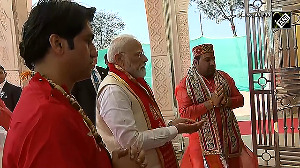On the evening of May 3, Dr H Kamkhenthang, a leading anthropologist and author from a Kuki sub-tribe, was studying in his bungalow's library in Imphal's Paite Veng, when all hell broke loose.

Suddenly, a mob gathered near the locality, pelting stones and shouting slogans asking residents to leave.
Manipur had been tense throughout the day with demonstrations and protests in Churachandpur and Imphal, some of which had turned violent.
"It was like Germany's Kristallnacht … all hell broke loose as racial tensions bubbled over and the mob started attacking our houses," said Hoihnu Houzel, an independent journalist and daughter of the well-known researcher on Northeastern tribes.
Kristallnacht, is German for the 'night of the broken glass' and is used to describe the progrom carried out against Jews on 9-10 December 1938.
"I rang up the chief minister, other ministers asking for help … for two to three hours the mob was allowed to rampage," she told PTI, reminiscing the fateful night when Manipur's racial amity was torn asunder.
Her old father and other family members had to use a ladder to escape to a Meitei neighbour's house.
Paite Veng is a colony where many affluent Paite tribals as well as Meitei families lived in the heart of Imphal.
"Everyone I rang up promised help, promised Army rescue … but the reality is that the Army was sent in much later," Hauzel claimed.
Their close neighbour Vungkham Hangzo, also from the Paite Zomi community, and his wife Madhumati Khwairakpam, a Meitei, had just finished dinner at their house on the main road leading to the tiny but posh locality, when the mob came.
Their daughter Manchin recounted, "Suddenly there was the sound of clanging on the electric poles. This was a call sign used in Manipur to gather a mob and it came – screaming, drunk and pelting stones. The church, the house opposite our's, were burnt and then we realised it was our turn."
Those who escaped remember there was glass all around. Anyone trying to leave with belongings had their bags snatched away, some were physically beaten up.
Others were given a passage by neighbours who were part of the mob.
Manchin carried her 86-year-old mother and was the last to leave her house.
Next door, her brother, 56-year-old U Thanlkhanlian, had already started moving into a neighborhood hotel run by Meiteis for safety where Manchin and her family first rushed to safety.
"The police came but they remained silent spectators," said Thanlkhanlian. First cars were upturned, then set on fire, followed by houses.
"It seemed pre-planned … the crowd got time to wreak mayhem on Kuki and mixed marriage houses in our locality,” he added.
Manchin described the scene as one of 'wanton devastation' as 'lovely houses we had grown up in were licked by flames'.
The aged anthropologist, Thanlkhanlian, Manchin and many neighbours who managed to escape the mob were eventually rescued by the Army and taken to a camp. Most left for neighbouring states by air to escape the madness which followed.
Some 40 houses in the quiet little neighbourhood and a church were lost forever that night.
A brick kiln and farms that the Hauzel family owned on the outskirts of Imphal was also targeted.
"Everything was destroyed overnight- tractors, JCBs, the kiln machinery," Hoihnu Hauzel said.
Attackers scrawled on the wall of the property in large letters -- 'Cannot be sold, cannot be bought'.
All the Paite Veng residents now living in different locations in neighbouring states or Delhi said they would not return.
"There is no trust, no peace left," said Manchin.
"We have to start life afresh, elsewhere… there is no other way that I can see," said Thanlkhanlian.











 © 2025
© 2025